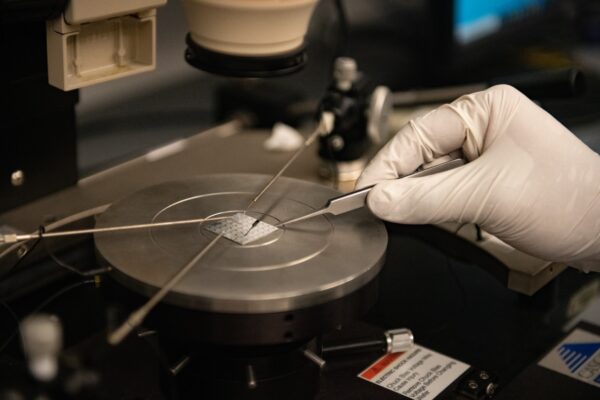AUSTIN, Texas — A new master’s degree program at The University of Texas at Austin will help fill the demand for semiconductor scientists and engineers and give students a chance to lead the next wave of innovation in the booming semiconductor industry.
Starting in the fall of 2025, UT will offer a new Master of Science in Engineering with a major in semiconductor science and engineering. The program, a collaboration between the Cockrell School of Engineering and College of Natural Sciences, will give students a deep understanding of the science of semiconductors and how to engineer and manufacture these devices.
“This program fits squarely within our University’s strategic plan, as we push to become the world’s highest impact public research university,” said President Jay Hartzell. “We bring together talented faculty and students, and prepare our graduates to tackle hard problems and explore big opportunities. This program does all of that for semiconductors, an area of great need for Texas and our country. I can’t wait to see the innovative leaders we know we will produce.”
This will be the first program in the state, and one of a select few nationwide, to develop a workforce of master’s students to bolster a semiconductor industry hungry for talent.
“The semiconductor industry in the U.S., and Texas in particular, is growing rapidly, and UT is leading the way in training the next generation of semiconductor leaders,” said S.V. Sreenivasan, a professor in the Cockrell School’s Walker Department of Mechanical Engineering and founder and chief technology officer of the Texas Institute for Electronics (TIE). “With this new program, we will give students the tools and experiences to make an impact on this important industry.”
U.S. semiconductor companies are expected to add approximately 31,000 new masters-level jobs by 2030, according to a July 2023 report from the Semiconductor Industry Association and Oxford Economics. Nearly 40% of those jobs risk going unfilled due to a lack of qualified candidates.
Texas accounts for 17.5% of all semiconductor employment in the U.S., approximately 43,800 people. More than a quarter of those jobs require a graduate degree, and about a third of the workforce is expected to retire within the next decade. Approximately 1,000 new master’s students will need to be trained each year just to replace those retiring workers in Texas and keep up with demand.
“Semiconductors power our modern electronics and are a critical part of our everyday lives, with sectors from health care to clean energy to many more relying on them,” said David Vanden Bout, dean of the College of Natural Sciences. “The semiconductor industry needs innovative scientists and engineers of the type UT will help prepare to be the backbone of this workforce for years to come.”
The program will give students the chance to work in UT’s elite facilities and organizations, including TIE, a University-sponsored consortium of preeminent semiconductor systems and defense electronics companies, national labs and academic institutions; the NASCENT center; the Microelectronics Research Center; and the Center for Dynamics and Control of Materials, as well as through alliances with semiconductor companies.
It will include four tracks students can take: semiconductor manufacturing, circuits and systems, heterogeneous integration and semiconductor devices.
“Nowhere else will students have the opportunities to work with leading semiconductor companies, access to world-class facilities for education and research, and the chance to conduct hands-on research like they will as part of our semiconductor science and engineering program,” said Roger Bonnecaze, dean of the Cockrell School of Engineering.
The program is pending final approval by the University of Texas System and the Texas Higher Education Coordinating Board.
In addition to the master’s program, a new certificate called semiconductor science and engineering: semiconductor processes and devices will be offered through the Cockrell School and Texas Engineering Executive Education. The certificate offers an opportunity for continuing education in semiconductors and a path to enter the industry from other fields.
“Our overall goal is to make the semiconductor field more accessible for students from all walks of life, whether they are just starting their educational journey and looking to get into the field, already working in semiconductors and want to enhance their education, or coming from other fields and want to get in on the semiconductor action,” said Michael Cullinan, associate professor in the Walker Department of Mechanical Engineering and director of the program.
These new offerings build on UT’s momentum in semiconductors. Last year, the University and Samsung announced a wide-ranging partnership to develop the talent pipeline to support the semiconductor ecosystem in Central Texas.
Underpinning this activity is the U.S. CHIPS Act and its Texas equivalent that have pumped billions of dollars into the semiconductor industry. The Texas Legislature recently approved $552 million from the Texas CHIPS Act for TIE.




